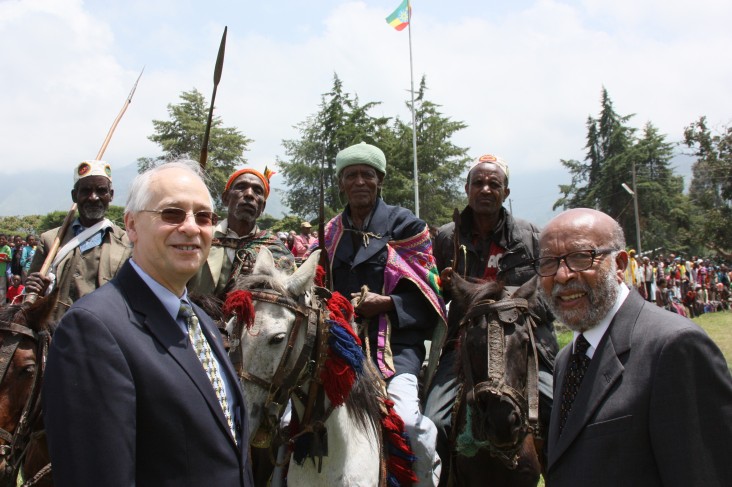
It is my pleasure to represent the American people at this signing of two agreements to support Project Mercy’s inspiring work to improve the health and livelihoods of communities in Yetebon and Chacha. Shortly after I arrived in Ethiopia in 2010, I had the pleasure of visiting Project Mercy and learning about the wonderful work being done by Marta and Deme. Last January, USAID Administrator Raj Shah and Senator James Inhofe came from Washington to see the remarkable work being done here. I am pleased to be here once again to see the progress that has been made since 2010. I am especially pleased to launch two U.S. assistance activities that strengthen and expand existing Project Mercy projects, and which move beyond emergency food and medical assistance to our shared goals of ending preventable deaths of mothers and children and promoting sustainable development in the communities where Project Mercy operates for generations to come.
Project Mercy is guided by the untiring and generous leadership of Marta and Deme. They provide a model for community development. They are motivated by their faith and their belief that people can achieve much if given a little guidance and assistance. Marta and Deme are also role models for how members of the Ethiopian Diaspora can contribute to Ethiopia’s development. When they returned to Ethiopia from the United States, they decided they would make a difference by becoming partners in the development of their communities. This approach respects the dignity of people and affords them an opportunity to unlock their own potential.
Project Mercy educates more than 1,600 children, giving them the essential key to opportunity – the ability to read and write. Project Mercy provides health care and health education and promotes improvements in every aspect of community life, from food supply to housing to hygiene. Their work benefits some 70,000 people.
Today, along with our USAID implementing partners, CNFA, Jhpiego, and Project Mercy, we are launching two initiatives. The first is here at Project Mercy’s hospital in Yetebon. As part of USAID’s Human Resources for Health project, Jhpiego will greatly expand midwife training and community education to save the lives of mothers and newborns. Because women traditionally have not had or chosen not to use skilled assistance at medical facilities, like the one here, too many have died unnecessarily giving birth, or they have lost their infants in the first year of life. Over the next four years, 400 midwives will be trained here and some 3,000 mothers and children will benefit directly from the support to maternal and child health services.
The second initiative is part of Project Mercy’s activities in Chacha in the Amhara region. Through USAID’s Livestock Market Development project, CNFA experts will improve the ability of 65 families to manage dairy cows and increase production. Over the two years of the project, families will improve their nutrition and earn income from sales of dairy products.
Ethiopian families are very conscious of the nutritional importance of milk, particularly for children. But poor genetics in the cows, insufficient access to proper animal feed, and poor management practices all contribute to low productivity levels. Similarly, there are many challenges in getting the milk to market.
Project Mercy embarked upon a program to cross-breed high-producing milk cows from the United States with local cows. Now, farmers will have access to crossbred dairy heifers and feed supplies on a commercially sustainable basis. The Project Mercy farm is ready to provide 15 heifers to 15 households in 2013, and 50 additional heifers to 50 households in 2014. Our cooperation will link the targeted households to markets to ensure that milk produced by these heifers is converted into household income estimated at approximately USD$1,200 per household, or about 22,000 Birr, by 2014.
Improving the health and economic status of Ethiopians is a collaborative endeavor between government, donors, business and non-profit organizations. None can do it alone. Enterprising, community-focused nongovernmental organizations like Project Mercy are an important part of the development effort in any nation, including my own. This is why I am proud that Project Mercy will receive assistance from the U.S. Government valued at almost two million dollars. This will greatly enhance the impact of the donations that private Americans make to Project Mercy.
I commend and encourage organizations, such as Project Mercy, which complement and work in partnership with government efforts to help move Ethiopians closer to their aspirations for growth and transformation, peace and prosperity.
Thank you.
See also
Remarks by U.S. Ambassador to Ethiopia Donald E. Booth [PDF, 143 KB]
News Story: USAID-Project Mercy Partnership
Related Resources
USAID Ethiopia: Agriculture and Food Security
USAID Ethiopia: Feed the Future







Comment
Make a general inquiry or suggest an improvement.